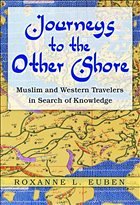The contemporary world is increasingly defined by dizzying flows of people and ideas. But while Western travel is associated with a pioneering spirit of discovery, the dominant image of Muslim mobility is the jihadi who travels not to learn but to destroy. Journeys to the Other Shore challenges these stereotypes by charting the common ways in which Muslim and Western travelers negotiate the dislocation of travel to unfamiliar and strange worlds. In Roxanne Euben's groundbreaking excursion across cultures, geography, history, genre, and genders, travel signifies not only a physical movement across lands and cultures, but also an imaginative journey in which wonder about those who live differently makes it possible to see the world differently.
In the book we meet not only Herodotus but also Ibn Battuta, the fourteenth-century Moroccan traveler. Tocqueville's journeys are set against a five-year sojourn in nineteenth-century Paris by the Egyptian writer and translator Rifa'a Rafi' al-Tahtawi, and Montesquieu's novel Persian Letters meets with the memoir of an East African princess, Sayyida Salme.
This extraordinary book shows that curiosity about the unknown, the quest to understand foreign cultures, critical distance from one's own world, and the desire to remake the foreign into the familiar are not the monopoly of any single civilization or epoch. Euben demonstrates that the fluidity of identities, cultures, and borders associated with our postcolonial, globalized world has a long history--one shaped not only by Western power but also by an Islamic ethos of travel in search of knowledge.
Table of contents:
Acknowledgments xi
Note on Transliteration and Spelling xiii
CHAPTER 1: Frontiers: Walls and Windows--Some Reflections on Travel Narratives 1
CHAPTER 2: Traveling Theorists and Translating Practices 20
Theory and Theoôria 20
"Seeing the Entire World as a Foreign Land" 24
Exposures and Closures 29
Islam, Travel, and talab al-'ilm 34
The Double-Edged Nature of Travel 38
Travel as Translation 41
CHAPTER 3: Liars, Travelers, Theorists--Herodotus and Ibn Battuta 46
Herodotus 52
Ibn Battuta 63
Conclusion 86
ChAPTER 4: Travel in Search of Practical Wisdom: The Modern Theôriai of al-Tahtawi and Tocqueville 90
Authorizing Autopsy 98
Travels across Time and Space 108
Multiple Mediations 114
Conclusion 132
CHAPTER 5: Gender, Genre, and Travel: Montesquieu and Sayyida Salme 134
Montesquieu's Persian Letters 144
Sayyida Salme's Memoirs 156
Conclusion 171
CHAPTER 6: Cosmopolitanisms Past and Present, Islamic and Western 174
Notes 199
Glossary 267
Bibliography 271
Index 303
In the book we meet not only Herodotus but also Ibn Battuta, the fourteenth-century Moroccan traveler. Tocqueville's journeys are set against a five-year sojourn in nineteenth-century Paris by the Egyptian writer and translator Rifa'a Rafi' al-Tahtawi, and Montesquieu's novel Persian Letters meets with the memoir of an East African princess, Sayyida Salme.
This extraordinary book shows that curiosity about the unknown, the quest to understand foreign cultures, critical distance from one's own world, and the desire to remake the foreign into the familiar are not the monopoly of any single civilization or epoch. Euben demonstrates that the fluidity of identities, cultures, and borders associated with our postcolonial, globalized world has a long history--one shaped not only by Western power but also by an Islamic ethos of travel in search of knowledge.
Table of contents:
Acknowledgments xi
Note on Transliteration and Spelling xiii
CHAPTER 1: Frontiers: Walls and Windows--Some Reflections on Travel Narratives 1
CHAPTER 2: Traveling Theorists and Translating Practices 20
Theory and Theoôria 20
"Seeing the Entire World as a Foreign Land" 24
Exposures and Closures 29
Islam, Travel, and talab al-'ilm 34
The Double-Edged Nature of Travel 38
Travel as Translation 41
CHAPTER 3: Liars, Travelers, Theorists--Herodotus and Ibn Battuta 46
Herodotus 52
Ibn Battuta 63
Conclusion 86
ChAPTER 4: Travel in Search of Practical Wisdom: The Modern Theôriai of al-Tahtawi and Tocqueville 90
Authorizing Autopsy 98
Travels across Time and Space 108
Multiple Mediations 114
Conclusion 132
CHAPTER 5: Gender, Genre, and Travel: Montesquieu and Sayyida Salme 134
Montesquieu's Persian Letters 144
Sayyida Salme's Memoirs 156
Conclusion 171
CHAPTER 6: Cosmopolitanisms Past and Present, Islamic and Western 174
Notes 199
Glossary 267
Bibliography 271
Index 303

